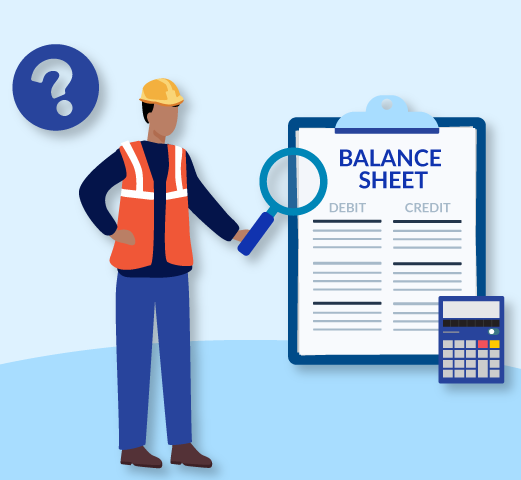
A regular review of your company’s financial statements is an important part of making business decisions. Losses or poor cash flow can be an indication of slow payment — a perpetual problem in the construction industry. But they can also be red flags that indicate fraud or financial mismanagement. The federal indictment on fraud and embezzlement charges against one construction CFO in New Jersey highlights the risk to any company when the wrong person is in charge of business finances. So how does a company protect themselves against fraud or financial losses? Here are six financial controls every business should implement.
How to spot fraud and other financial problems
Most of us know fraud when we see it. In business, it often takes the form of theft of either property or money, bribery, stealing benefits, or stealing payroll. Employees use their position within the company to take what isn’t theirs. Workers in the financial department often have the best access to this information and the most opportunity, but anyone can steal a business’s property.
Detecting fraud within your company is difficult, especially if you aren’t involved in the day-to-day work. However, there are some signs that you can look for that may indicate fraud:
- An unexplained reduction in inventory
- Missing important documents
- Multiple payments made to the same vendor
- Increasing invoice volume
- Lots of adjusting journal entries
- Unexplained transactions
Loss of any kind impacts a business. If inventory is missing, that means sales will be down, which reduces profits. If money is missing, the business may not be able to pay its bills or its employees. There’s also a loss of trust when an employee resorts to fraud.
Companies may be hesitant to hire someone for the same position after they’ve been burned. This can lead to overworked and stressed employees who have to fill that person’s shoes and clean up the mess.
What circumstances create financial fraud?
According to the National Association of Certified Valuators and Analysts, there are four common factors that create the ideal circumstances for fraud:
- Opportunity: A lack of business and financial controls can provide an opportunity for an employee to take advantage of the business. Small businesses are particularly vulnerable due to the fact that they generally have fewer financial controls.
- Rationalization: Employees will invent reasons that make their fraud justified.
- Pressure: An employee with internal or external pressure to earn more may be at risk. This could include outstanding debt or credit issues.
- Capability: The employee has to have the patience, access, and knowledge to perform the fraud and not get caught.
Learn More
Construction Fraud: Common Issues and How to Combat Them
6 financial controls to help prevent fraud
According to Attorney John Coyle from Coyle Law Group, the best way to prevent employee fraud is to have a system of transparency and awareness. Your financial processes and procedures should lend themselves to a spirit of openness and constant review.
“People working in the company need to set up checks and balances,” said Coyle. “There needs to be disclosure of financial statements, and the ability to access bank records, tax returns, and copies of invoices. The more centralized control you’ve given to one person, the bigger chance there’s a problem.”
Here are some concrete ideas to help you prevent fraud in your company.
1. Give multiple people financial responsibility
Make sure you have at least two people who regularly review each other’s work and oversee the financial aspects of the company.
You’ll want to segregate the duties each person performs so you reduce the chance a person could commit fraud. For example, the person who writes checks should not perform the bank reconciliation. The statement should be reviewed by another person who can verify that all the checks are business related and are going to the right entity or person.
2. Plan regular board review of financial statements
The more oversight your company board of directors has and the more involved they are in the daily activities, the sooner they can spot any financial anomalies. The board should review financial statements at least quarterly. The level of review and timing will depend on the size of the company and how involved the board is.

The more oversight your company board of directors has and the more involved they are in the daily activities, the sooner they can spot any financial anomalies. The board should review financial statements at least quarterly. The level of review and timing will depend on the size of the company and how involved the board is.
Another option is to have a senior financial officer review the financial statements on a regular basis, with the board providing an overall review at certain intervals.
In a construction company, the board should review the profit and loss or income statement, balance sheet, and work-in-progress report. They should look for accounts that aren’t clearly explained or where the balances seem out of line.
3. Audit your financial statements
At least yearly you should have your financial statements audited by a CPA with expertise in the construction industry. Construction accounting is different from standard business accounting, so the more industry experience the CPA has the better.
Note that banks and potential clients may ask for audited financial statements before approving a loan or going under contract with you.
4. Require your employees take time off
Often fraud is detected when an employee is on vacation or away for a period of time. When other workers have to take over the person’s work, they find anomalies that wouldn’t be noticed otherwise. By requiring your employees to take time off you allow time for others to review their work while they’re gone.
5. Hire a controller
According to Robert Half, a staffing agency specializing in accounting and bookkeeping, “A controller oversees an organization’s daily accounting operations, including the accounting, payroll, accounts payable and accounts receivable departments. The controller also helps guide a company’s strategic financial decisions — and is therefore integral to the financial health of the firm.” Having someone oversee your financial department can help prevent fraud.
Learn More
Construction Accounting: Do You Need A Bookkeeper, Controller, or CFO?
6. Require corporate controls for major financial decisions
Attorney John Coyle recommends that companies create controls to prevent major financial decisions being made by one person.
For example, you could require that any board decision be signed by multiple parties, not just the president or one board member. This prevents a single member from making a decision that benefits them without the knowledge of other members of the board.

Maintain transparency and awareness
Like in many things, the best defense against fraud is to prevent it before it happens. Transparency and awareness are your number one defenses against it. Setting up financial controls, processes, and procedures that naturally allow for the review of your employees’ work is the best way to discourage theft. When employees know that their work is being checked, they are less likely to attempt to defraud the company.